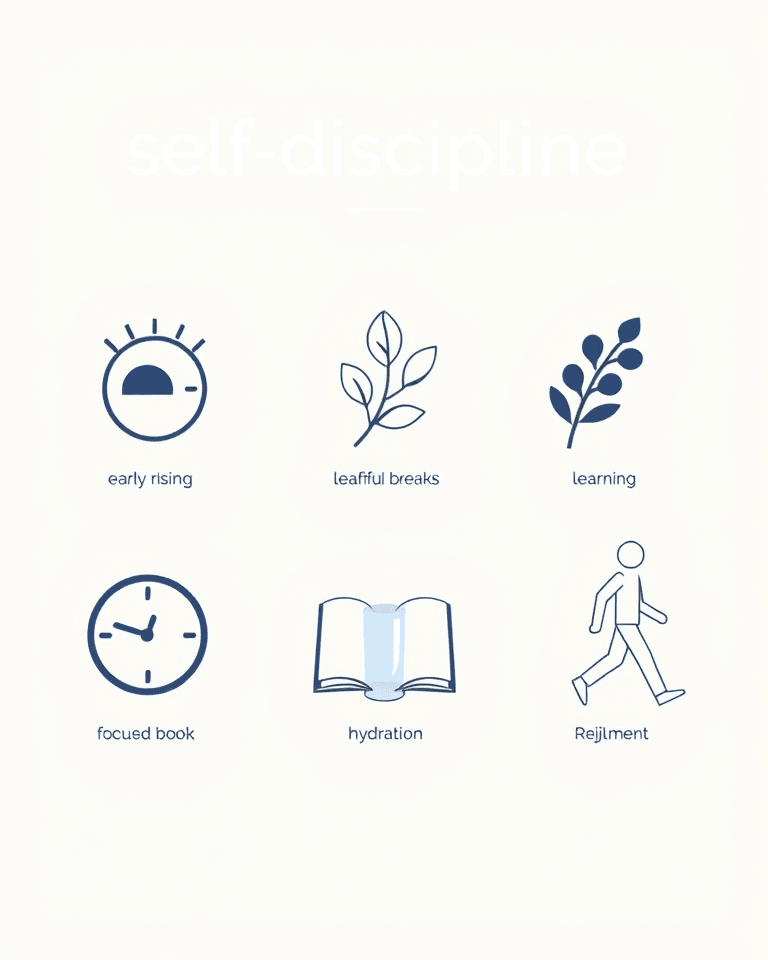Self-discipline, the ability to control one’s impulses and actions to achieve long-term goals, is often touted as the cornerstone of success. While common advice emphasizes setting clear goals and sticking to routines, some lesser-known habits can significantly bolster your self-control. Here are five such habits that are rarely discussed but can make a substantial difference in your journey towards greater discipline.
The Power of Discomfort Training
Most people try to avoid discomfort, but consistently stepping outside your comfort zone can be a powerful tool for building self-discipline.
Embracing Uncomfortable Tasks
We often procrastinate on tasks that make us uncomfortable, such as difficult work assignments, tough conversations, or even physical challenges. However, deliberately facing these discomforts strengthens your ability to push through resistance. By starting with small, uncomfortable tasks, you can build resilience and expand your comfort zone, making it easier to tackle bigger challenges later. For example, if you find public speaking daunting, start by practicing in front of a small group of friends.
Sitting With Urges
Urges, like the desire to procrastinate or reach for unhealthy food, are often fleeting. Instead of immediately giving in to them, practice simply observing them without acting. Set a timer for a short period, perhaps 10 minutes, and sit with the urge. This discomfort training will help you recognize that you can tolerate the urge and don’t have to be controlled by it. This helps create a space between the impulse and your action, allowing you to choose your behavior rather than react automatically.
Honesty: The Underestimated Virtue
Honesty is crucial, both with yourself and others, to build genuine self-discipline. It helps in aligning your actions with your intentions.
Emotional Honesty
Being honest about your feelings, especially with yourself, is a rarely discussed aspect of self-discipline. Instead of suppressing emotions or avoiding difficult conversations, addressing them head-on allows you to manage them constructively. This self-awareness is crucial for making rational decisions instead of being swayed by emotional impulses. When you acknowledge your true feelings, it prevents these feelings from driving your behavior.
Being Accountable to Yourself
Honesty also applies to your commitments. If you say you’re going to do something, do it, or have a valid reason why you can’t. This isn’t about proving anything to others, but proving to yourself that you’re reliable. Track your intentions and actions, and hold yourself accountable when there’s a discrepancy. When your actions align with your words, you’re on the right path to self-discipline. This method can be as simple as journaling and checking your progress at the end of the day.
Leveraging the Power of Small Actions
Big goals can often feel overwhelming, leading to inaction. Instead, focusing on small, manageable steps can be surprisingly effective in building discipline.
Micro-Goals
Instead of trying to change everything at once, tackle small, easy actions that you can’t refuse. For example, if you want to start a new exercise routine, commit to just 10 minutes a day. If you have a big project due, focus on doing the first few paragraphs, this approach helps overcome procrastination by making it less daunting to begin. These small wins build momentum, and consistency over time can lead to significant achievements.
The “Just Start” Principle
Often, the hardest part is just starting. If you have a task you’re avoiding, commit to working on it for just five minutes. The momentum you gain from this small effort can make it easier to continue. This “just start” principle helps reduce resistance, making it easier to overcome the inertia that can sabotage self-discipline. By consistently taking small actions you create a pattern of progress.
Self-Care: The Foundation of Self-Control
Self-discipline is not solely about pushing yourself hard; it’s also about taking care of your overall well-being.
Prioritizing Physical Health
Good self-discipline is directly linked to physical health. Regular exercise, balanced nutrition, and adequate sleep recharge your willpower and provide the energy you need for mental clarity and focus. Make sure to ditch processed foods and sugary snacks, as they can drain your energy and make it harder to resist temptations. By strengthening your body, you also bolster your willpower.
Mindfulness and Stress Management
Practicing mindfulness and managing stress are crucial for sustained self-discipline. Incorporate stress-reducing techniques like deep breathing, meditation, or journaling. These activities help you stay grounded and make decisions from a place of calm rather than reacting to stress. Emotional well-being is vital for self-discipline, and self-care practices are crucial for maintaining it.
The Importance of Delayed Gratification
Self-discipline is often about choosing long-term benefits over short-term pleasures, this requires the practice of delaying gratification.
Resisting Temptations
Resisting temptations is another significant part of building discipline. Proactively remove temptations from your environment. If you’re trying to eat healthier, do not keep junk food at home. If social media is your weakness, use app blockers. By making it harder to engage in unwanted behaviors, you are creating systems to avoid self-sabotage.
The Power of Patience
Delayed gratification is about being patient with the process. It is not an overnight fix. Learning to value patience is essential for maintaining focus and discipline in pursuit of long-term goals. Celebrate small victories, as every time you resist temptation, you’re strengthening your willpower.
In conclusion, while setting clear goals, creating routines, and time management are key aspects of self-discipline, these lesser-known habits can enhance your self-control. By embracing discomfort, being honest with yourself, focusing on small steps, prioritizing self-care, and practicing delayed gratification, you can build a stronger foundation for self-discipline. These habits, often overlooked, offer a more nuanced approach to achieving your goals and improving your overall well-being.










